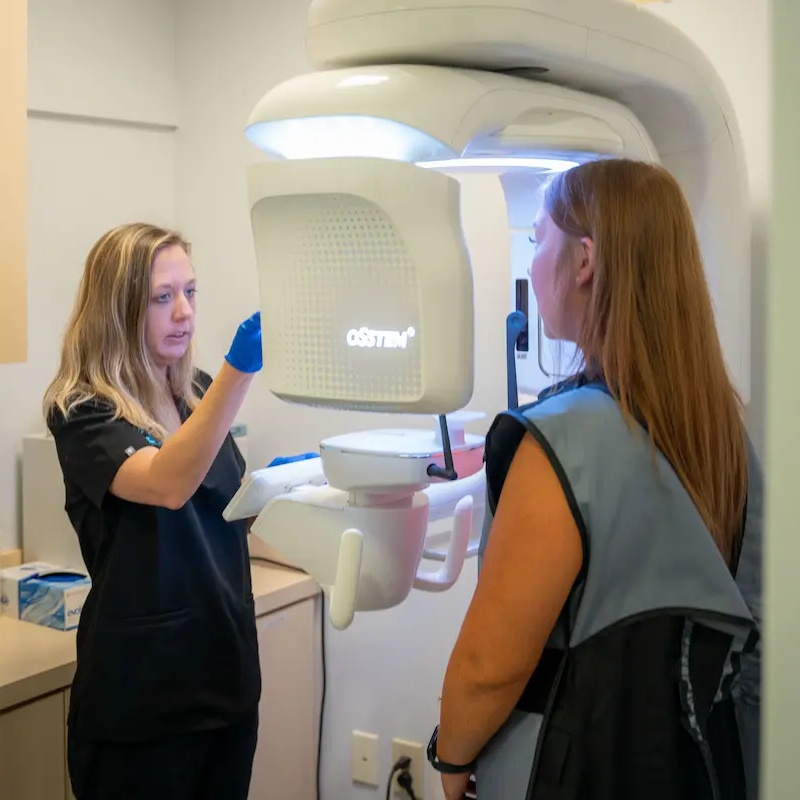Sleep Apnea & Health
How Sleep Apnea Impacts Your Health and Quality of Life
Sleep apnea is far more than loud snoring or restless nights—it is a condition that can quietly affect nearly every system in the body. At Palmetto Sleep, we work with patients across Georgia to identify how sleep apnea may be influencing both physical and mental health, and we provide treatment plans tailored to each individual’s needs.
When breathing repeatedly stops during sleep, the body experiences cycles of oxygen deprivation. These interruptions, combined with frequent awakenings, place stress on multiple organ systems. Below, we explore the widespread effects of untreated sleep apnea.
Endocrine and Metabolic Health
Sleep apnea disrupts hormone balance and glucose control, raising the risk of long-term metabolic conditions. Patients with untreated sleep apnea may experience:
- Insulin resistance, increasing the likelihood of type 2 diabetes.
- Metabolic syndrome, including high blood pressure, abnormal cholesterol, and elevated blood sugar.
- Weight gain, driven by disrupted sleep patterns and hormonal changes.
At Palmetto Sleep, we emphasize education and lifestyle support as part of a comprehensive treatment strategy.
Heart and Circulatory System
Sleep apnea places significant strain on the cardiovascular system. As oxygen levels drop repeatedly at night, the heart must work harder, leading to:
- Elevated blood pressure (hypertension).
- Irregular heart rhythms, such as atrial fibrillation, which can raise stroke risk.
- Heart failure caused by ongoing strain.
- Increased chance of sudden cardiac events.
Learn more about the connection between cardiovascular health and sleep apnea in our educational resources.
Liver and Digestive Function
The effects of sleep apnea extend to liver and digestive health. Poor oxygenation and fragmented sleep may contribute to:
- Nonalcoholic fatty liver disease and scarring.
- Worsening of acid reflux (GERD) during the night.
- Sluggish metabolism and chronic fatigue.
These issues may develop without obvious digestive symptoms, highlighting the importance of early detection.
Respiratory Health
Since sleep apnea originates in the airway, it often worsens existing breathing conditions, such as:
- Asthma flare-ups.
- Increased symptoms of chronic obstructive pulmonary disease (COPD).
- Reduced exercise tolerance due to labored breathing.
For some patients, oral appliance therapy provides a comfortable, non-invasive way to improve nighttime breathing.
Brain and Cognitive Function
Restorative sleep is vital for mental clarity and neurological health. When left untreated, sleep apnea may lead to:
- Memory lapses and brain fog.
- Mood changes, including irritability and depression.
- Difficulty concentrating and slower reaction times.
These challenges can affect work, relationships, and daily life. For more information, see our page on the psychological effects of sleep apnea.
Quality of Life and Daily Functioning
The ripple effects of poor sleep reach beyond health concerns. Fatigue, lack of motivation, and social withdrawal are common among patients with untreated sleep apnea. Even oral health may play a role in how sleep apnea develops and progresses, making early treatment especially important.
Frequently Asked Questions
How does sleep apnea affect daily performance?
It leads to fatigue, trouble focusing, slower reaction times, and irritability—all of which can reduce productivity and performance at work or school.
Can sleep apnea cause weight gain?
Yes. Poor sleep disrupts appetite-regulating hormones, often leading to cravings, reduced energy, and weight gain.
Does sleep apnea increase the risk of depression or anxiety?
Ongoing sleep deprivation and oxygen imbalances can contribute to mood disorders, including anxiety and depression.
What are the long-term risks of untreated sleep apnea?
Serious complications may include hypertension, diabetes, cardiovascular disease, liver damage, and cognitive decline.
Can sleep apnea harm the heart?
Yes. It is closely linked to high blood pressure, arrhythmias, heart failure, and even sudden cardiac events.
Take Control of Your Health with Palmetto Sleep
At Palmetto Sleep, we believe restful, restorative sleep is essential for long-term health. With clinics in McDonough, Fayetteville, Palmetto, and Zebulon, our team—led by Dr. Jordan Brunson, DDS—offers advanced diagnostics and personalized solutions, including alternatives to CPAP therapy.
Call (770) 230-0222 or contact us online to schedule your consultation. Better sleep can change your health, energy, and overall well-being.

Related Services
We'll See You Soon!
Phone:
(770) 230-0222
Email:
info@palmettosleep.com
Fayetteville
210 Trilith Pkwy #130
Fayetteville, GA 30214
McDonough
70 Westridge Pkwy #100
McDonough, GA 30253
Palmetto
501 Park St.
Palmetto, GA 30268
Zebulon
15988 Barnesville St.
Zebulon, GA 30295
Office Hours
Monday 8:30 am – 5:00 pm
Tuesday 8:30 am – 5:00 pm
Wednesday 8:30 am – 5:00 pm
Thursday 8:30 am – 5:00 pm
Friday 8:00 am – 12:00 pm
Saturday Closed
Sunday Closed
Excellence in Care for the Entire Family
Book Your Visit Today
Don’t wait, schedule your appointment with our friendly team today.
